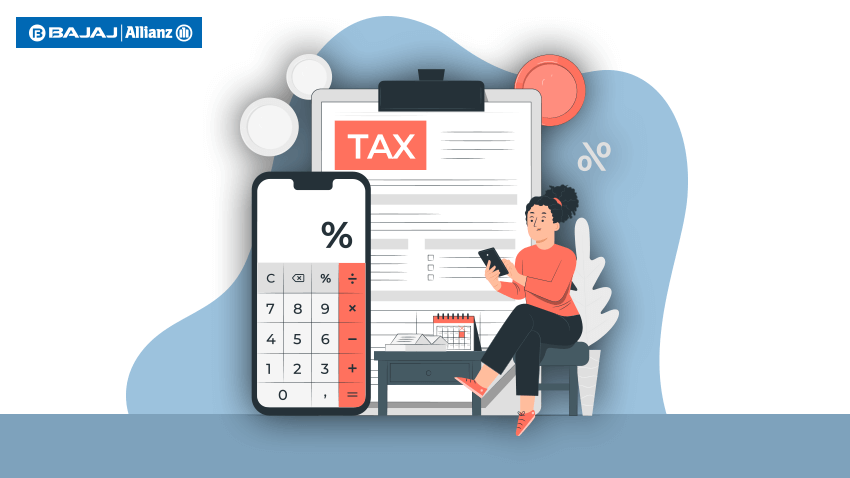Section 80EEB is a newly-incorporated Section in the Income Tax Act of 1961. It specifies income tax rules and benefits for those who have availed of a loan to purchase electric vehicles. The tax benefits provided under Section 80EEB have been incentivized as a part of the FAME {Faster Adoption and Manufacture of (Hybrid &) Electric Vehicles} India Scheme.
The number of electric vehicles sold per year has been increasing, almost hitting the one-million mark with 9,99,949 units sold in 2022, as per GOI’s Vahan portal. This is a staggering 210% jump from the 3,22,871 units sold in 2021. With the rise in the adoption of electric vehicles, insurance companies have also started providing specialized
electric vehicle insurance policies.
If you already have an electric vehicle or are planning to own one soon, it can be helpful to know the tax benefits you can attain under Section 80EEB. Here’s a guide on the same.
Overview of Section 80EEB
Since electric vehicles are considered an eco-friendly alternative to traditional fuel-operated vehicles, the FAME scheme and the various benefits provided under the same also have an environmental concern. Introduced by the Finance Minister in Union Budget 2019 and in effect from the assessment year 2020-2021, Section 80EEB aims to encourage electric vehicle adoption by providing tax-related incentives.
Section 80EEB allows direct tax benefits to taxpayers on the interest they pay on their electric vehicle loan. It is to be noted that every electric vehicle as defined under the Section comes under the tax benefit purview. It is not limited to four-wheelers or two-wheelers only.
Did you know?
Electric vehicles plying on Indian roads must have minimum third-party electric vehicle insurance coverage as per the Motor Vehicles Act of 1988. You attract fines and penalties if you don’t have one.
Features of Section 80EEB
Listed below are important features of Section 80EEB that you must know before you plan to claim the deduction:
-
Only applicable to individuals
The tax benefits provided under Section 80EEB are only applicable to individual taxpayers who have availed of a loan for electric vehicles. Entities such as HUFs (Hindu Undivided Family), registered companies, associations of persons, and so on, cannot claim any benefits under this Section.
Business entities may compensate for this exclusion by using their
electric bike insurance or car insurance premiums to claim tax benefits. As per prevalent laws, expenses made towards a car (including policy premium payments) used for commercial purposes can be used to lower the profits of a business that are taxed in the end
[2].
-
“Electric vehicles” definition
As per Section 80EEB, an “electric vehicle” refers to a vehicle that is powered by an electric motor exclusively. The traction energy for the vehicle should be provided by the battery installed within the vehicle. The vehicle should also have a regenerative braking system which leads to the conversion of the kinetic energy of the vehicle into electrical energy when the brakes are applied.
Thus, vehicles that meet this definition shall be considered for deductions under Section 80EEB.
This definition also includes electric commercial vehicles, whose owner-drivers can claim this deduction and benefit regarding tax-saving. Owners of electric commercial vehicles may also benefit by opting for an
electric vehicle commercial insurance policy since it allows them access to good-quality repairs.
The maximum amount one can claim against the interest on their loan repayments for electric vehicles is Rs 1.5 lakhs. Thus, an individual making use of an electric vehicle for personal use can save Rs 1.5 lakhs on their taxes.
Ensure to save and preserve the receipts of the interest paid, loan documents, and other relevant documents handy when claiming for the deduction.
Eligibility Criteria for Claiming Section 80EEB deduction
Apart from the above points, the taxpayer should meet the following conditions to be eligible for the deduction:
- The electric vehicle loan must be sanctioned after the 1st of April, 2019. Interest paid on the loan for all the years after this date can be used to claim tax deductions, as per prevalent laws.
- The loan (for which the interest is being paid) shall be taken from a financial institution or a non-banking financial company (NBFC) as defined under Section 80EEB. A loan taken from a credit society, acquaintance, family member, and so on, shall not be considered.
- The individual applying for the tax deduction shall not own any other electric vehicle during the period when they have been sanctioned the loan.
In conclusion
Aside from allowing you to save taxes, an electric vehicle can also provide economic benefits. Since electric vehicles run on battery, one can save on the fuel costs that they would have otherwise spent for their conventional vehicles.
Many people hesitate to opt for EVs because they are concerned about the high repair costs. Having a well-designed
electric car insurance policy or bike insurance policy can help immensely in such a scenario; the policy takes care of the repair costs, and in the case of cashless repairs, you do not have to wait for reimbursement either. *
Note: Please note that tax benefits are subject to change in prevalent tax laws.
*Standard T&C Apply
Insurance is the subject matter of solicitation. For more details on benefits, exclusions, limitations, terms, and conditions, please read the sales brochure/policy wording carefully before concluding a sale.
 Service Chat:
Service Chat: 

